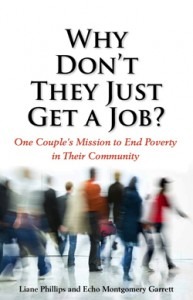
Last Wednesday, my friend Karl and I drove together to a “homeless awareness” event sponsored by the Longmont Housing Opportunity Team (LHOT). We missed part of the evening session because we stopped to get some Good Times for dinner — their fries are really hot! — but we arrived just in time to hear Dave Phillips give the keynote address about Cincinnati Works, the non-profit employment program he and his wife, Liane, started in Ohio in 1996. His talk centered around the question, “Why don’t they just get a job?” which is also the title of a book Liane co-wrote. Here’s what I took away from the presentation:
- Untapped potential — The homeless population is the single largest untapped workforce in the country. Nine to 10 percent of the working age population in the United States lives under the federal poverty line. Phillips said plenty of entry-level jobs are available despite the impression we might have gotten from the mainstream media. In partnership with local employers, Cincinnati Works places clients in unskilled, entry-level jobs at $9-$11 per hour with benefits. (To achieve-self sufficiency, clients need to have an income of 250 percent of the federal poverty line or greater, which translates to making approximately $18 per hour.) Ultimately, Cincinnati Works helps lower retention costs for businesses and save tax dollars by removing people from public assistance and welfare programs.
- The necessity of partnership — Cincinnati Works has more than 14 non-profit partners, including ones that specialize in housing and mental health. On average it takes clients six to eight years to achieve self-sufficiency. In order to help them move toward stability it’s necessary to help clients remove every barrier — unstable housing, unreliable transportation, health conditions, expensive child care, lack of savings, lack of self-confidence, etc. — keeping them in poverty.
- The inhumanity of our systems — Phillips lamented that our systems and the federal programs in place to help people at the bottom of those systems are “punitive.” I agree. He also talked about how our “systems want results.” That’s true both of our society as a whole and programs like Cincinnati Works. There is an important place for “measurables,” especially for an employment agency, and I for one would do well to apply to my own efforts some of the business principles Phillips shared. But I have to say I get a little uncomfortable when I hear more about retention rates, return on investment and proof of concept than the stories and struggles of the people that all those numbers and ideas represent.
- The human element — Respect for clients and belief in the tenacity of the human spirit is the No. 1 requirement for working with people in need. Phillips said, “We…believe in [clients] before they believe in themselves.” Absolutely crucial. It’s really saying something that Cincinnati Works has been doing that for people and alongside them for 15 years.
- One stop shops? — This wasn’t the focus of his talk, but Phillips mentioned in passing that the State of Ohio has one-stop “benefit centers” for people in poverty. Great idea! Other states (and/or counties) should follow Ohio’s example. (I wonder how many others already do.) If a bank made customers go to one location to make a deposit, another to make withdrawals and yet another to apply for a loan, it would lose all its customers. So why do some states and counties make clients go to several separate locations to apply for different kinds of aid when they could be better served doing it all in one place? I know it’s true that most state and county governments are strapped financially and they would say they can’t afford to combine services in one location. What they might not say that is equally true is that people in poverty have no other alternatives.

